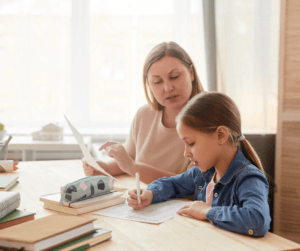 As I’ve shared before, my kids are not neurotypical. None of them have a learning pattern that would have really worked in a typical public school classroom. Before homeschooling, I worked in schools as an OT. I sat in IEP meetings. I wrote accommodations and goals. While many parts of an IEP do not apply in homeschooling, there are ways I have accommodated my kids and their needs. While I’ve probably accommodated my kids in hundreds of ways, here are some of my top picks for you to consider in your homeschooling.
As I’ve shared before, my kids are not neurotypical. None of them have a learning pattern that would have really worked in a typical public school classroom. Before homeschooling, I worked in schools as an OT. I sat in IEP meetings. I wrote accommodations and goals. While many parts of an IEP do not apply in homeschooling, there are ways I have accommodated my kids and their needs. While I’ve probably accommodated my kids in hundreds of ways, here are some of my top picks for you to consider in your homeschooling.
Flexible Scheduling
When my kids were small and woke up early in the morning, we started our school time right after breakfast. As they got older, their school day shifted to work with their biorhythms. At one point, this meant that my youngest still was doing school around 8:00 AM, the middle child started around 10:30AM and the oldest didn’t start until after lunch. Each of them had one to two hours of my undivided attention and we often went on field trips all together or did projects together in the afternoon.
However, each of my children has also had times they dealt with insomnia. Not sleeping means they aren’t mentally or physically prepared for a school day. For this reason, I’m flexible about taking days off. We can do school on weekends or in the summer when my child is feeling better instead of trying to work when their brain is just not ready to learn.
Reading and Scribing
 I am a huge fan of reading out loud to your children. A student can appreciate the story, humor, details, and vocabulary while listening to a good book. They do not need to read it for themselves to appreciate it. For many years, I read aloud our history, literature, and science even if the child could have read it for themselves. For a child with dyslexia, or one who has better auditory processing skills, this can be a great way to take stress out of the school day and connect.
I am a huge fan of reading out loud to your children. A student can appreciate the story, humor, details, and vocabulary while listening to a good book. They do not need to read it for themselves to appreciate it. For many years, I read aloud our history, literature, and science even if the child could have read it for themselves. For a child with dyslexia, or one who has better auditory processing skills, this can be a great way to take stress out of the school day and connect.
If you aren’t comfortable reading out loud, you can also listen to audiobooks together! I did eventually realize that my child with hyperlexia and difficulty with auditory processing did better reading to himself. Either way, they got the material and information, and that was what was important.
I also scribed regularly for all my kids up until high school. They told me what their answer should say and I wrote or typed it up exactly as they said it. Then we could correct it if needed. It took away the stress of handwriting, spelling, and holding their thoughts in their heads all at once. It gave them freedom to focus on their answers. This set them up to use voice-to-text tools in high school. However, two of my kids really blossomed with typing their essays in later high school anyway. I’m a big believer that seeing and creating great sentences instead of ones limited by their writing abilities set them up for later success.
Following Their Interests
 One thing almost no public school can do well is give students a chance to do a deep dive into their own interests. They have curriculum to follow and too many students to work with at once. However, being able to let your child explore topics of their own choosing, learning about what they are most interested in, is wonderful. Humans are naturally curious. We generally want to learn.
One thing almost no public school can do well is give students a chance to do a deep dive into their own interests. They have curriculum to follow and too many students to work with at once. However, being able to let your child explore topics of their own choosing, learning about what they are most interested in, is wonderful. Humans are naturally curious. We generally want to learn.
In our homeschool, I have been able to set aside the typical subjects so my children could learn what they wanted to learn. For one child, this meant we spent years learning about dinosaurs and the evolution of life on earth. That was their interest. For another child, the news and how the world works held their attention. My youngest started their own garden and has had a passion for the outdoors.
I have flexed our studies to make room for what they wanted to know at each age. We still study the core subjects such as math, history, literature, spelling, etc. But we incorporate these core subjects into lessons on the chosen interest. And we make sure to leave plenty of time in the schedule to dedicate to the chosen topic or activity.
Keeping My Sanity
All that said, I have had to figure out how to do these things and not be overwhelmed. I have had to find curricula that worked with their interests, because I couldn’t always make up something. I definitely couldn’t make something up on the fly, day after day. I found curricula that worked with the teaching style I needed for each child. I also made sure that even if I was trying to work with each of them one-on-one, that I made time for my own lunch. Taking care of yourself is important.
While accommodating your kids, it is important to keep in mind two things. One is that they don’t need to be ready for graduation until they are actually in their senior year. The other thing to remember is that colleges can also give them accommodations. If you find in high school your student needs a lot of accommodations to succeed, consider doing testing to prove their needs and get documentation so they can get the help they need in college.





0 Comments